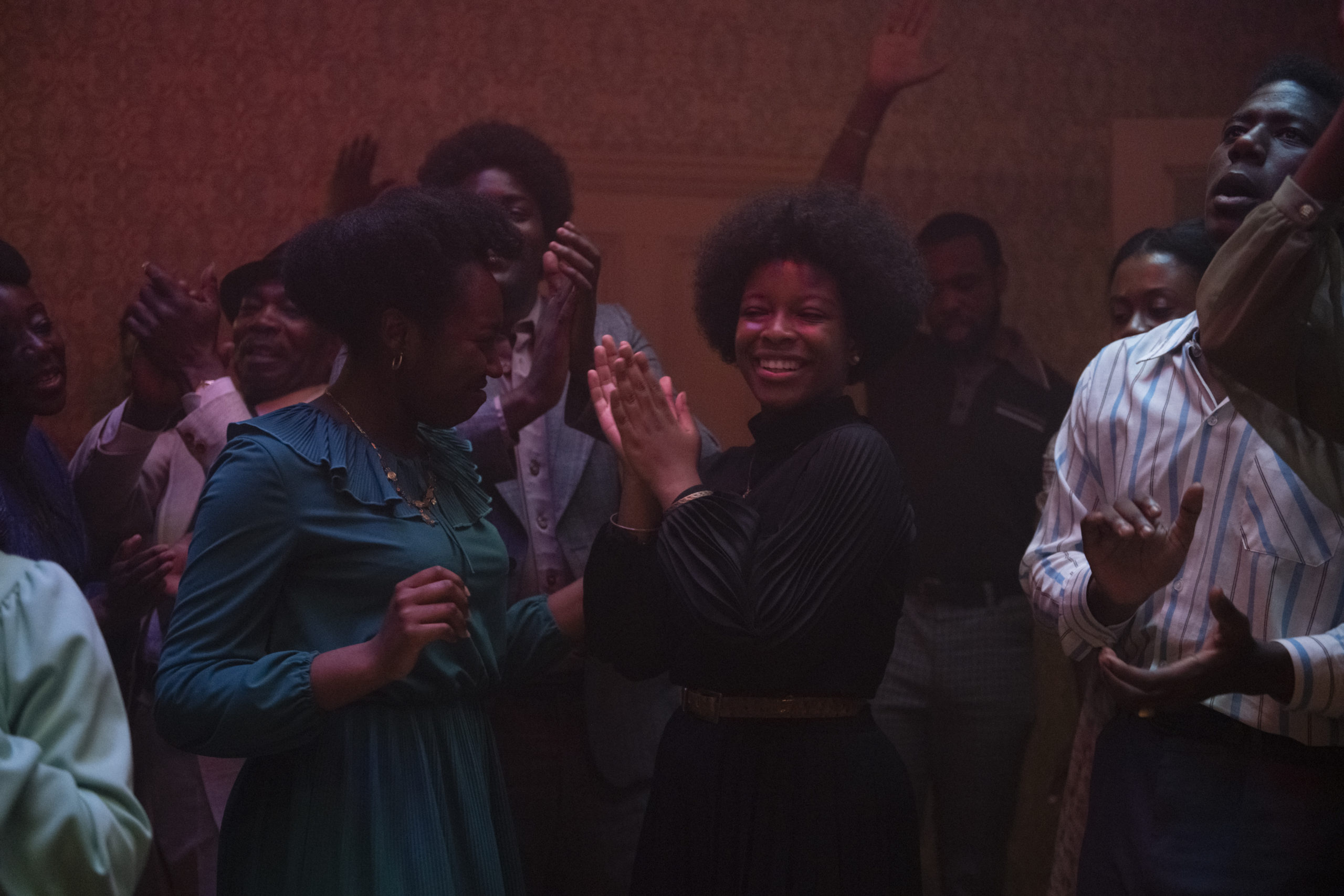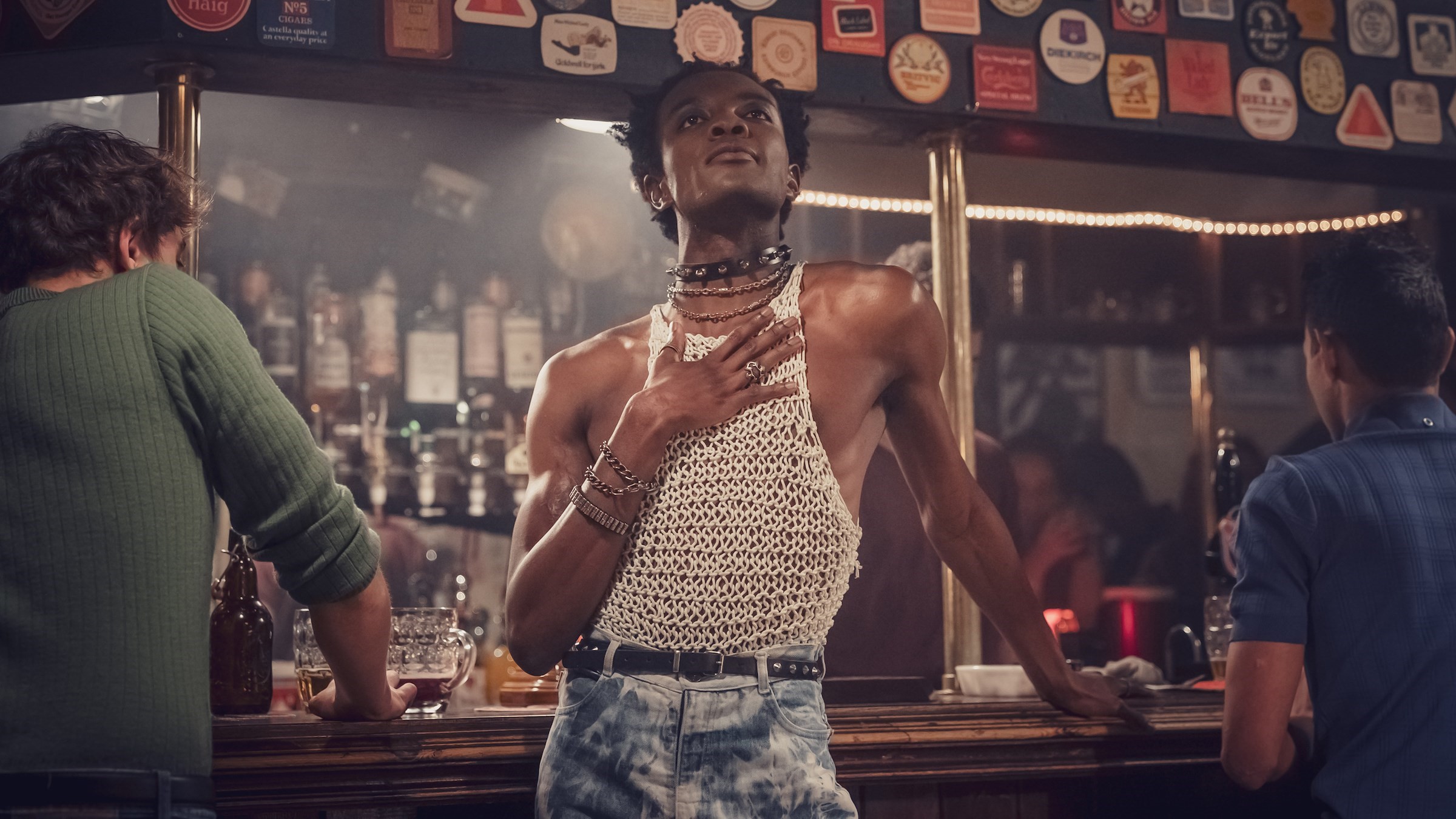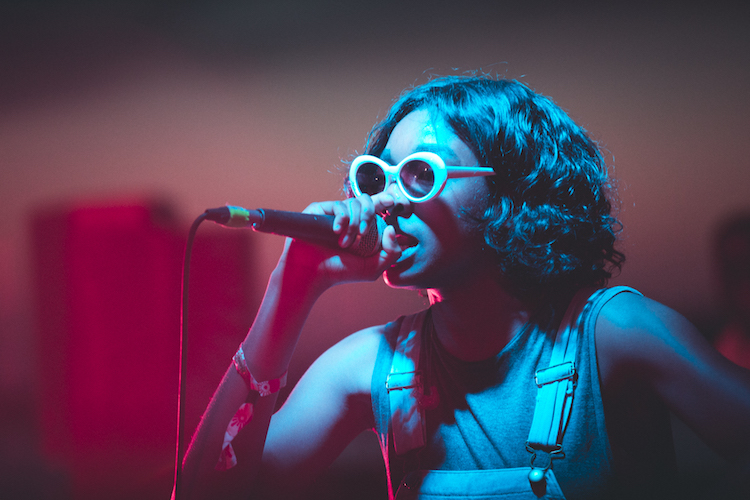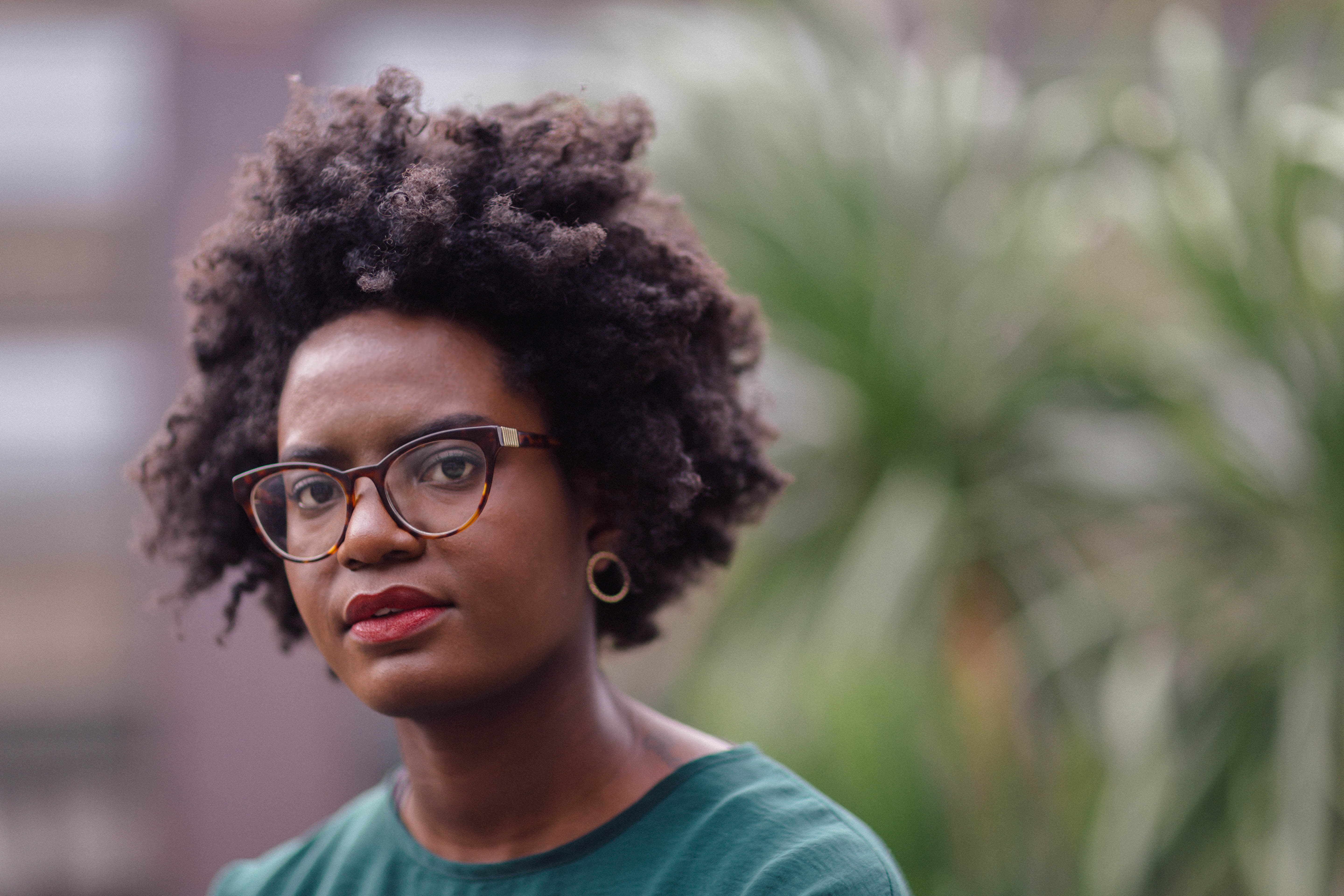
Still via BBC / Small Axe
Real stories from the dancefloors of the Lovers Rock era
The women of the Lovers Rock generation spill their night-time dance party secrets, from sneaking out of bedroom windows to catching respectful whines.
Chanté Joseph
28 Nov 2020
Lovers Rock is a love story set against the backdrop of a joyous and sweaty blues party, appearing as part of Small Axe – a new collection of five films from Steve McQueen. Given that our education system deliberately ignores Black British history and erases the contributions of Black people to politics, culture and British identity, Small Axe is a welcomed rarity. Each film is made with us, our nuances and our feats in mind. But Lovers Rock feels particularly special.
In the 1970s and 80s, Black people, and particularly Black men, were unwelcome in white nightclubs. Instead, our elders partied until the early hours of the morning at house parties, unbothered and happy. This is the scenario depicted in Lovers Rock. Martha (Amarah-Jae St. Aubyn) and Franklyn (played by Michael Ward) meet in the dance and become so enamoured it’s as if they’ve known one another for years.
Their love, traced throughout the course of the night with a few dramatic twists and turns, exposes the intimacy and spirituality of Lovers Rock as a music genre and how our elders were unabashedly forthright with one another when it came to romance in a way this generation could literally never. Catching respectful whines on the dancefloor – walking each other to the bus stop in the morning.
It’s an ode to romantic reggae, a uniquely British sound formed by the children of the Windrush generation. Any Black British Caribbean person will recognise Lovers Rock from their family gatherings – namely ‘Silly Games’ by Janet Kay, the euphoric (and piercing) track that carries the entire film. Who hasn’t tried to hit those sky-high notes?
Our elders, sometimes suffering from generational trauma, are known to be reticent when it comes to sharing their pasts; but this has only been exacerbated by the lack of appetite for Black narratives in the mainstream media. Many in our generation are starved of tales of these scenes, subcultures and joyous snapshots in our shared histories.
So, I spoke to people of the Lovers Rock generation about their memories from that time, the anthemic tunes that soundtracked their romances, pride in the homegrown genre and the atmosphere at the parties.
Gloria Sawyers, 62
“Lovers Rock were like anthems to us when we were young Black people and they still are. If you got a group of us together and started playing that music we’d all be singing along to it. Caroll Thompson ‘I’m so sorry’, Peter Hunningale, Sylvia Tella, Janet Kay of course. I can’t remember what I read five minutes ago, but I can remember the songs from back in the day.
Not long ago someone was saying to me that they don’t know how we could let man rub up on us like that – the way we used to dance. [But] it was expected. I don’t know who laid the law down or whatever but if some guy asked you to dance it would be close and intimate. Your bodies were practically sleeping together and 90% of them were gentlemen, 10% were dickheads. Saying no could honestly start fights because of the male ego. The rejection, especially if they were in a group of their guys.
“Not long ago someone was saying to me that they don’t know how we could let man rub up on us like the way we used to dance. But it was expected”
But when I think about that era, I think of romance. Lovers Rock was particularly British, it didn’t come straight from Jamaica. All the Reggae music that we had initially was from Jamaica and Lovers Rock was homegrown.
During those times there weren’t places for Black people to go. They would let Black girls come in but they would exclude and make it difficult for guys to come. They didn’t want the Black guys coming in, especially when there were white women in there.
When we used to travel to go to dances, we wouldn’t just stay in London or Manchester, we travelled from all over the place to Birmingham and Liverpool. There was a lot of squatting going on at those times, someone might have a squat and throw a party. It was always dark. If you were still there when the lights came up, that’s when everybody’s looking at each other saying: “oh my god is that what you really look like?”
Fearline Whyte, 64
“Growing up, I distinctly remember going to Askew Crescent [in Shepherds Bush, West London] – there used to be a blues dance there in a basement. In those days only parents had keys to the house we had to sneak in and out. I used to sneak out my window, and I was very brazen because my mother’s window faced the road so I could have got caught. We used to wait for our parents to go to sleep, back then people didn’t stay up late watching TV, by 11 o’clock they were fast asleep.
Getting ready wasn’t a big fuss like it was today, we just had our afros and hid our nice dresses and shoes until we got there. I also had somebody that drove who was waiting for me. You’d pay to come in, there would be loads of people in the passageway and inside it was empty with no furniture, just floorboards.
“I used to sneak out my window to go to blues dances, and I was very brazen because my mother’s window faced the road so I could have got caught”
When you got in everyone was against the wall and too shy to dance in the middle. I didn’t meet anybody I knew at the dances because people came from far and wide. I’d go to dances outside my area because I didn’t want to see anybody else I knew there.
You know the part in the film where they tapped the women’s elbow? That used to happen all the time. You’d turn around a look and if you don’t like the look of them you’d probably say no. If you’re an ugly bloke you won’t get dance! I used to think, well that person actually has the courtesy to ask for a dance so sometimes I would actually dance with them.”
Joanne Joseph, 61
“Sometimes we would go to about three house parties in one night and one party could be on the other side of London [from the others]. When we went out, we’d have about three cars full of people, I remember once getting stopped by the police because there were eight of us in a car.
When I got to the dance, I was dancing until it was time to go, sometimes we wouldn’t even get a drink. We’d get there at 11 at night and wouldn’t leave until four in the morning. I’d always be heading for the wall, nobody wanted to be in the middle so when you get to the dance early you’d find your spot on the wall. Though you’d always have the odd person dancing in the middle of the floor taking up space.
“Small Axe was accurate when it came to fashion, when we went out we’d always look our best, you wouldn’t be out there looking shabby”
I also remember there was always a queue for the toilet but that was where you’d start talking to people and it was always a lovely atmosphere. Small Axe was accurate when it came to fashion, when we went out we’d always look our best, you wouldn’t be out there looking shabby. Although I certainly don’t miss the days when you’d come home smelling like smoke. You could always tell you’d been out the night before because your hair, everything would be stinking of smoke.
When it comes to music I’m a soulie, I love my soul music. When you saw them doing their moves when the soul records came on that was me I would move around using my feet everything would be going!”
Joanne Alemoru, 52
“I caught the tail end of this as I was a bit younger and more into hip hop. Back in those days, those basements were always so dark and full of smoke. It would get in your hair. Men would breathe down your neck and some of them had bad breath. It was just like “go away”. One time I remember my friend Hazel had gone out. The music comes on as I’m waiting for her to come back in.
“Men would breathe down your neck and some of them had bad breath”
It was custom for a guy to lift his arm out to ask you for a dance but Hazel’s boyfriend asked me for a dance. He pulled me towards him but I just thought ‘Oh dear. N,o I can’t do this’. He was grinding and I just thought ‘this is not right’. He said it was just a dance but I disagreed and told him it was very personal actually. She took forever to come back so I just didn’t tell her in the end. I preferred clubs where people would body pop.”
Shelley Hurley, 65
“There was a lot I could Identify with in Small Axe. The dance was always on a Saturday night and church was on Sunday morning. Dances were always a social thing, a fashion show of sorts. Everybody wanted to outdo the next person. Women would get their hair pressed with a hot comb but you would sweat it all out anyway and men would wear their Gabicci tops.
We found out about the parties through word of mouth, whoever had a soundsystem would spread the news of a dance and we would all know where to be. If someone’s parents went away to Jamaica for a month or so people would have parties in their house. Sometimes you’d have to pay to get in because people were using a lot of gas and electricity to cook so they have to put money in the meters.
“The dance was always on a Saturday night and church was on Sunday morning”
These dances were important because you couldn’t go to white people’s parties or get into clubs in the west end. Growing up in Tottenham at the time there were only about four Black girls in my school so we were quite alienated. The best part of these dances was that I was able to meet people from St Lucia, Dominica, Barbados, all over the Caribbean; they would become your friends and you’d exchange ideas and eat at each other’s houses.”
All interviews are edited down and condensed, additional reporting by Kemi Alemoru









